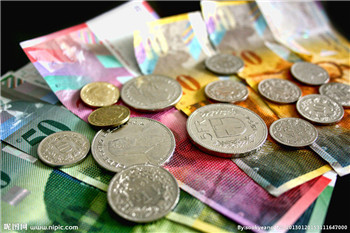
Riding out currency swings is part and parcel of international business — but even for the more battle-hardened members of Switzerland’s watch industry, the wild gyrations that 2015 brought have been a challenge.
经受住汇率波动是国际商务的家常便饭————但即使是对经历过大风大浪的瑞士制表商而言,2015年的汇率剧烈波动也是一项挑战。
The most dramatic was the appreciation of the Swiss franc, which briefly surged 39 per cent against the euro in January after the Swiss National Bank ended its longstanding SFr1.20 cap against the single currency.
最戏剧化的变动是瑞士法郎的升值。今年1月,当瑞士央行宣布放弃长期实行的1欧元兑1.20瑞士法郎的上限后,瑞士法郎兑欧元汇率一度飙升39%。
The Swiss franc is currently around 10 per cent stronger. However, the decline of the euro, rouble, yen and renminbi and the rise of the dollar have also contributed to watchmakers’ headaches.
瑞士法郎目前大约升值10%。然而,欧元、卢布、日元和人民币的贬值以及美元的升值,也让制表商头痛。
“It was really an extreme event to see the Swiss franc move so much, and generally from a currency perspective it has been an extreme year,” says Luca Solca, an analyst at Exane BNP Paribas. “To me, the currency environment, with all the moves we have seen, resembles the beggar-thy-neighbour policies of the 1930s, where everyone was trying to get their currencies to depreciate.”
“瑞士法郎如此剧烈的波动真的是个极端事件,而从汇率视角看,今年整体而言是极端的一年。”法国巴黎银行证券部(Exane BNP Paribas)分析师卢卡∠尔卡(Luca Solca)表示:“在我看来,我们看到的汇率环境的所有变动,都像是上世纪30年代的‘以邻为壑’政策,各国都试图让本币贬值。”
Jon Cox, of Kepler Cheuvreux, takes a similar line. “The lifting of the cap came completely out of the blue, and was a huge shock to Swiss watchmakers,” he says.
开普勒盛富(Kepler Cheuvreux)的乔恩柯克斯(Jon Cox)持类似看法。“取消汇率上限完全突如其来,对瑞士制表商造成了巨大冲击。”他说。
“When the franc went to parity with the euro it put the fear of God into the industry. Swiss watchmakers are used to dealing with the strong franc, but it was the speed of the move that was so difficult.”
“当瑞士法郎逼近和欧元等价的水平时,行业不寒而栗。瑞士制表商习惯于应对强劲的瑞士法郎,但这次造成困难的是汇率变动的速度。”
The currency swings present two big problems for the Swiss watch industry. The first is that the rise of the franc has pushed up watchmakers’ costs, the bulk of which are incurred in Switzerland, in contrast to their earnings, which are in a variety of currencies.
汇率波动给瑞士手表业带来了两大难题。第一个难题是瑞士法郎的升值使制表商的成本相对于利润上升。这些制造商的成本主要在瑞士发生,而利润则由多种货币构成。
The second problem is that the diverging currency movements have opened up gaps between the prices of the same watches in different countries. With some Swiss watches selling for hundreds of thousands of euros, even a small percentage difference in prices can create the chance — and incentive — for customers to arbitrage.
第二个难题是,不同的汇率变动使同款手表在不同国家的价格产生了差距。一些瑞士手表的售价高达数十万欧元,即使价格只发生微小的百分比变动,客户也会有机会和动机进行套利。
“If you are buying a SFr100,000 [$100,800] watch, it only needs to be a few per cent cheaper in another country for it to be worth your getting in a plane, flying over and buying it there,” says Mr Solca.
“如果你要购买一块售价10万瑞士法郎(合10.08万美元)的手表,只要这款手表在另一个国家的售价低百分之几,坐飞机去那个国家购买就是值得的。”索尔卡表示。
Of the two problems, the price differential is easier to deal with.
这两大难题中,差价的问题更容易解决。
The response among watchmakers has broadly fallen into two categories. The first group — including brands such as Omega, Swatch and Rolex — have put prices up in Europe, but not cut them elsewhere.
制表商的应对大体上可以分成两种。第一组制表商在欧洲提价,但在别处并不降价,这一组包括欧米茄(Omega)、斯沃琪(Swatch)和劳力士(Rolex)等品牌。
Richard Mille is chief executive of the company that bears his name; it has put up its prices in euros by about 20 per cent. “I did not want a gap to develop between the US and Europe,” he says. “I decided a few years ago that we would make sure our prices were the same everywhere in Swiss franc terms.”
理查德猠勒(Richard Mille)是与他本人同名的手表公司的首席执行官。该公司将旗下产品的欧元价格提高了约20%。“我不希望美国和欧洲之间产生差价。”他说,“几年前我就决定,我们要确保我们在每个地方的售价以瑞士法郎计算都是一样的。”
Not all brands have been so aggressive. On average, says René Weber, an analyst at Bank Vontobel in Zurich, brands have put up euro prices by about 8 per cent — not enough, he says, to offset the currency swings. “I think brands that have only changed their prices in euros will need another round of price increases next year.”
不是所有品牌都采取了如此激进的举措。苏黎世冯托贝尔银行(Bank Vontobel)分析师勒内韦伯(René Weber)表示,平均而言,各品牌把欧元价格上调8%左右——这不足于抵消汇率波动。“我认为那些只调整了欧元价格的品牌明年还需要进行一轮价格上调。”
The second group, which includes brands owned by Richemont, the Swiss luxury group, put up prices in Europe by a similar amount, but cut prices elsewhere — particularly in the dollar area — by between 5 and 8 per cent. Cutting prices is not something that watchmakers are keen to do, as it undermines their aim of fostering an image of exclusivity. However, Mr Weber says that this year it makes sense. “The situation has been so extreme, that it is absolutely justified,” he says.
第二组品牌在欧洲进行了类似幅度的提价,但还在别处(尤其是美元地区)进行了降价————幅度在5%到8%之间,这一组包括瑞士奢侈品集团历峰(Richemont)旗下的品牌。制表商并不情愿降价,因为这会影响他们打造高档品牌形象的目标。然而,韦伯表示,今年降价的举措是合乎情理的。“情况如此极端,这是完全有理由的。”他说。
Dealing with the impact of the franc’s surge on their cost base is far harder for Swiss watchmakers. Since one of their key selling points is the fact that their wares are “made in Switzerland”, one obvious response — shifting production to cheaper locations — is not an option.
对瑞士制表商而言,应对瑞士法郎大幅升值对其成本基础的影响要困难得多。因为它们的主要卖点之一就是“瑞士制造”,所以显而易见的应对方法————把生产业务转移到成本更低廉的地方——并不在考虑之列。
Instead, watchmakers are trying to control costs in other ways. Few comment on what they are doing. But Mr Cox says one response has been to adjust the contracts and working hours of staff.
制表商正努力用其他方式来控制成本。很少有制造商公开自己的应对方法。但开普勒盛富的柯克斯表示,其中一项是调整员工的合同和工作时间。
“IWC, for example, has been getting staff to volunteer to work shorter hours. Other companies have people working more for the same pay. Some have switched staff living in Germany and France from Swiss franc to euro contracts,” he says.
“例如,IWC让员工自愿减少工作时间。其他公司让员工在薪酬不变的情况下延长工作时间。有些公司把住在德国和法国的员工的瑞士法郎合同转为欧元合同。”他说。
Hiring has also ground to a halt — and some groups have gone further. Ulysse Nardin, the high-end brand snapped up in 2014 by the French luxury group Kering, confirmed in May that it would cut 26 jobs — or about 8 per cent of its Swiss workforce “to adapt to the needs of the market”.
招聘也陷入了停滞————一些集团则更进一步。在2014年被法国奢侈品集团开云(Kering)收购的高端品牌雅典(Ulysse Nardin)5月份证实,将削减26个职位,即8%的瑞士员工,“以适应市场需要”。
Some groups have cut capital spending where possible. But not everyone sees the situation as a cause for retrenchment.
一些集团尽可能削减了资本支出。但并非每家集团都把当前形势看作退缩的理由。
Nick Hayek, chief executive of Swatch Group, which owns brands such as Breguet, Omega and Longines, said in an interview with the Swiss economic newspaper Finanz und Wirtschaft that “continuing to invest, even when times are hard” had been “key to our success”. He shrugged off the idea that Swatch should cut its marketing spend to boost margins.
旗下品牌包括宝玑(Breguet)、欧米茄和浪琴(Longines)的斯沃琪集团的首席执行官尼克眠耶克(Nick Hayek)在接受瑞士财经报纸《财经和经济》(Finanz und Wirtschaft)的采访时说:“即使境况困难也要继续投资,”一直是“我们成功的关键”。他不认同斯沃琪应该削减营销支出来提高利润率的观点。
The upshot is that 2015 is likely to be a weak year for Swiss watchmakers. Exports in the first nine months are 2 per cent less than in the same period in 2014. If the trend continues, 2015 will be the first year since 2009 that Swiss exports have fallen.
对瑞士制表商来说,2015年很可能是不景气的一年。前9个月的出口同比降低了2%。如果这种趋势持续下去,2015年将成为自2009年以来瑞士出口下滑的第一个年份。












